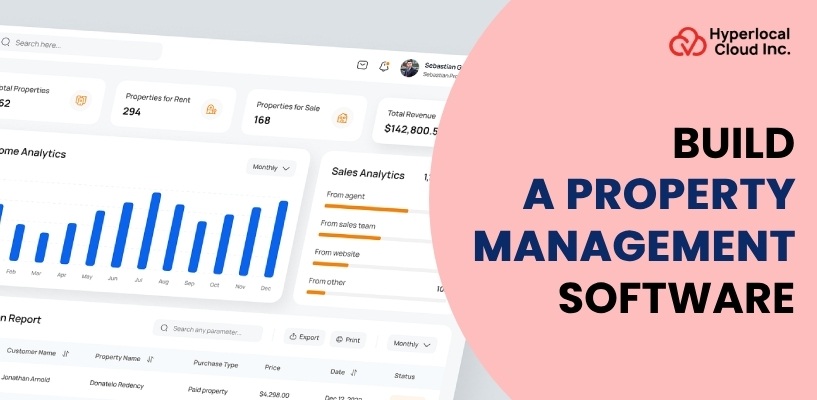How to Build Property Management Software for Small Landlords

Property management software, intended to assist property managers, landlords, and real estate professionals, has played an essential part in defining the real estate sector.
With the increased concern among small landlords about property management, it is critical to emphasize the significant difficulties that property management software can address.
The global property management software market size is expected to grow at a CAGR of 8.9% by 2030. When the software is increasing in massive numbers, it raises the possibility of annihilating challenges such as
Time Constraints: Like any other endeavour, inspecting properties by landlords who perform other full-time tasks takes more time.
Legal and Regulatory Compliance: Small landlords need help observing local rental ordinances, tenants’ rights, the law on housing, and the property security code.
Vacancy and Rental Income: Small landlords might take long periods to fill vacant spaces as they cannot afford to advertise or require assistance in attracting tenants in crowded market niches.
Financial Management: For small-scale landlords, rental income must be sustained in addition to paying the mortgage and property taxes and fulfilling numerous other obligations.
To overcome such challenges, developing property management software for small landlords is leaving no stone unturned. In this blog, learn about the development steps of property management software and how it benefits small landlords. Read on-
What is Property Management Software?
Property management software is a specific tool designed to increase the efficiency of many tasks connected with managing real estate properties. It allows one to oversee every part of a property and is widely used by property managers, landlords, and other real estate workers.
One of its primary purposes is to address tenant management, which means one can control the necessary accounts connected with the tenant, lease agreements and occasional payments, requests concerning maintenance, and communication.
Property management capabilities facilitate the management of maintenance requests, appointment schedules, and records. Lease management tools help manage leases, lease renewals, and documentation, seek to identify legal compliance issues, and avoid or mitigate risks.
Furthermore, it provides reporting and analytical tools practical for examining the property’s performance, occupancy level, financial data, and other factors that help with decision-making and planning.
Property management software aids in increasing the business’s performance and productivity, decreasing administrative tasks, and increasing tenant satisfaction. It also eases the growth of a property management company and ensures compliance with guidelines.
Connect With Software Development Wizards Of Hyperlocal Cloud Today!
Must-have Features of Property Management Software for Small Landlords
Deciding the features of property management software for small landlords requires attention to detail. They must register for an account, secure a domain name, and determine the structural layout of their business’s online home. Subsequently, customers navigate the software to acquaint themselves with the platform’s environment.
While small landlords build their profiles, it is essential to provide them with several key features designed to facilitate the management of rental and selling properties. Have a look-
Tenant Management: Landlords can input and later monitor all the details of their tenants, including their contacts, tenancies, and balance statements. They can update tenants’ details profiles and track lease renewals.
Rent Collection: This automated rent collection facet makes managing rent payments flawless. Tenants pay their rent online through the software, while landlords can set up automatic reminders for due payments. It diminishes the need for manual follow-ups.
Expense Tracking: The feature allows small landlords to upload receipts, generate reports for tax purposes, and categorize expenses, improving financial management. They can keep track of property-related costs such as repairs, utilities, and maintenance.
Maintenance Requests: Tenants send maintenance requests to Small landlords through the software. This feature allows them to track tenants’ requests and ensure timely resolution.
Lease Management: Digitally create, store, and manage lease agreements. This feature allows small landlords to set lease terms, renewal conditions, and clauses. Tenants can e-sign agreements online, saving paperwork and time.
Document Storage: The software stores crucial documents such as tenant agreements, leases, and inspection reports. It ensures easy access from anywhere and lowers the risk of losing necessary paperwork.
Communication Tools: Communication with the tenant is possible via messenger, where small landlords can contact them. The messenger can be announcements, notices, and reminders.
Reports and Analytics: This feature helps landlords prepare income statements for accounting purposes, rental collection reports, and occupancy statistics. They can also assess the present from the past to make the right decisions on maintenance, property addition, and care.
Tenant Screening: The software helps conduct background checks on potential tenants. It includes criminal records as well as credit and rental history. Landlords can select reliable tenants and diminish risks related to property and renting.
Automatic Reminders: The management system includes reminders for dates for lease renewal, maintenance, property, etc. This ensures landlords stay organized and leverage every critical deadline.
Online Listings and Marketing: Property management software enables landlords to generate online ads. The software also allows them to post listings on many rent websites, book appointments to view properties, and handle inquiries.
Security and Data Protection: The software prioritizes data security with encryption, secure logins, and regular backups. It shields sensitive information related to tenants and properties from unauthorized access or loss.
Top Property Management Software for Small Landlords
Here are different platforms leading the market and successfully meeting the needs of smaller property holdings. Have a look-
TurboTenant: Landlords use this software to manage smaller properties. It offers online rental applications, lease signing, tenant screening, and rent collection and lists vacancies on multiple rental listing websites.
RentRedi: Small landlords use this user-friendly tool to collect online rent, manage maintenance requests, and screen tenants. The software integrates with various payment methods, making it easy for tenants to pay rent online.
RentSpree: This app provides a comprehensive tenant screening and application processing solution. Landlords receive rental applications, credit reports, background checks, and eviction history data online, making the screening process more effective.
TenantCloud: The software, known for its flexibility and scalability, serves small landlords. It offers a personalized tenant portal where renters may file maintenance requests, contact landlords, and access vital documents.
DoorLoop: It stands out for its emphasis on automation. Automating late fee calculations and lease renewals helps landlords minimize errors. The software has extensive reporting capabilities, allowing landlords to quickly understand their financial performance and property management.
Build Your Own Property Management Software for Small Landlords
Unlocking Property Management Software Development Steps
While every step in developing property management software plays a vital role, experts perform them under the supervision of small landlords’ requirements and demands.
Below is a comprehensive guide outlining these development steps:
Define Requirements and Scope
Developers attempt the first step by collecting requirements through in-depth research and directly engaging small landlords. It includes understanding landlords’ pain points, requirements, and existing workflows.
Map the UI/UX
Developers document all UI/UX design phases, including software pages, features, and sections. They break down the detailed user flow and actions, such as providing an overview of properties, occupancy rates, pending tasks, and financial summaries.
Backend Development
The property management software development experts compile the platform’s core functionalities and business logic, which include user authentication, API integration, and automated notifications. The software contains alerts for lease expirations, maintenance requests, or overdue payments.
Frontend Development
Frontend technologies that bring UI design to life include React, Angular, or Vue.js for dynamic and responsive interfaces. Developers ensure accessibility standards are meeting users with disabilities and conduct usability testing to refine the interface feedback based on feedback.
Testing and QA Integration
Audit the software to identify and resolve bugs through unit testing, followed by integration testing to check module integrations. Further, developers perform User Acceptance Testing (UAT) for landlords to test the software in real-time.
Deployment and Launch
Deployment includes vital steps, such as hosting, which means selecting a reliable hosting provider. It also includes data migration and transferring existing data from legacy systems or spreadsheets to the new software.
Post-Launch Support and Maintenance
The software development wizards of a reputed real estate software development company like Hyperlocal Cloud provide continued support for addressing different issues and implementing updates. These updates include feedback collection, software updates, and technical support.
Perks of Real Estate Management Software
Real estate management software benefits small landlords and tenants. It helps landlords by simplifying administrative tasks, enhancing financial performance, and confirming compliance with legal requirements. Tenants leverage the software to avail of convenient rent payments, easy access to lease information, and responsive maintenance services. However, there are more advantages for tenants and landlords.
Property management software offers numerous benefits to small landlords and tenants, including increased transparency, efficiency, and communication throughout the property management process. Read on-
Benefits for Small Landlords
Streamlined Property Management: The program automates several duties, including maintenance requests, rent collection, and lease renewals. It saves time and reduces administrative stress.
Organized Financial Management: The software includes tools for tracking rental expenses and income and creating financial reports that streamline financial planning and tax preparation.
Enhanced Communication: The property management software includes notification or messaging features that simplify quick communication about tenants’ issues or updates.
Augmented Tenant Screening: The platform offers screening tools that analyze criminal records, credit history, and rental history, allowing landlords to make more educated tenant selection decisions.
Effective Maintenance Management: The program enables landlords to respond to, track, and manage maintenance requests, resulting in improved property care and faster resolution.
Benefits for Tenants
Convenient Rent Payments: Tenants get payment options through the real estate management software to make rent payments easy, quick, and secure.
Transparent Communication: Tenants easily communicate with small landlords regarding maintenance issues or concerns through the platform.
Maintenance Request Management: Tenants submit maintenance requests online, receive updates on repairs, and track their status, enhancing satisfaction and responsiveness.
Access to Lease Information: Digital access to renewal terms, lease agreements, and policies ensures tenants are informed and referred to the required documents.
Notifications and Reminders: Automated reminders for lease renewals, rent due dates, or upcoming assessments help tenants stay compliant and organized.
Additional Perk: Property management software allows tenants to provide reviews or feedback, persuading accountability and transparency in proper management systems.
Get A Free Expert consultation For Your Custom Property Software Development
Development Cost Factors of Property Management Software
Developing property management software requires a substantial budget, which significantly impacts the overall project cost. These cost factors are influenced by the software’s scalability, complexity, and specific requirements. Below are the critical cost attributes involved in property management software development:
Project Scope and Requirements Gathering: Collecting and documenting functional and non-functional software features, including the needs of property managers, tenants, maintenance crews, and other stakeholders
Technology Stack: Selecting appropriate technologies for backend operations. Creating intuitive graphical interfaces for property managers, tenants, and potential clients, focusing on responsive design, accessibility, and usability.
Security and Compliance: Implementing robust measures to protect tenant data, financial information, and property data. Ensuring adherence to legal regulations and guidelines.
Integration with Third-Party Systems: This involves connecting with external applications such as accounting tools, CRM systems, and payment platforms.
User Experience (UX) Design: Designing user-friendly interfaces for small landlords and tenants, including prototyping and iterative usability testing.
Testing and Quality Assurance: Conduct comprehensive testing throughout development stages to identify and rectify bugs, ensure cross-platform compatibility, and validate security measures.
Project Management and Communication: Costs associated with project management tools, hiring project managers, and coordinating development teams and stakeholders.
Documentation and Training: Developing user handbooks, FAQs, and property managers’ and tenants’ guidelines. Conduct workshops or create documentation to familiarize users and administrators with the software.
Legal and Licensing: Costs for obtaining licenses for software components and libraries used in development. Expenses for legal consultation and drafting of contracts, terms of service, and policies.
Scalability and Future Growth: Planning and designing the software architecture to accommodate future scalability needs efficiently. Budgeting for future software updates, new features, and changes in business requirements.
External Factors: Considerations such as the availability of development resources, technological advancements, and competitive landscape impact costs. Factors like geopolitical stability, trade tariffs, and data protection laws are important when deploying software in different global markets.
Wrapping Up!
Developing property management software is a game-changing venture in the real estate world. It has many features that help small landlords to enjoy the industry with the best services. They get a chance to step in and understand the market. The software comes with endless possibilities.
The software is the fuel that helps small landlords make informed decisions and sell/rent their property hassle-free. By harnessing the power of technology, landlords understand their property’s value and use for the present and the future.
The blog has unveiled diverse features and benefits crucial in convincing small landlords to opt for property management software for an unparalleled experience.





